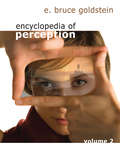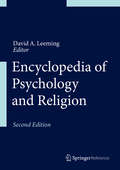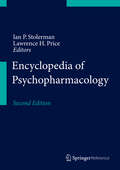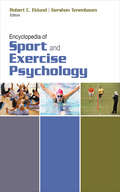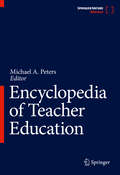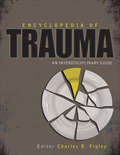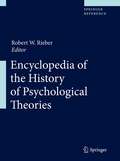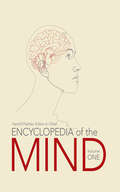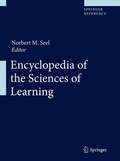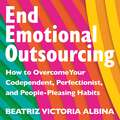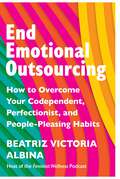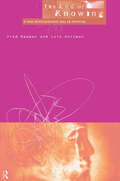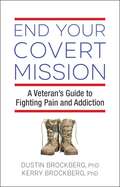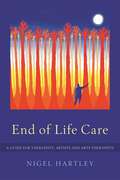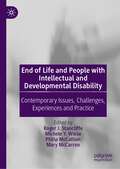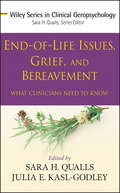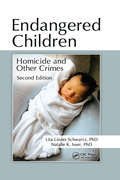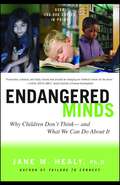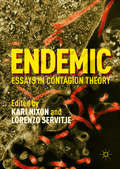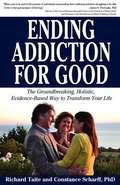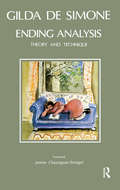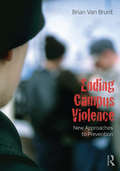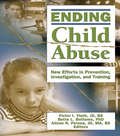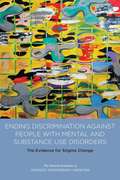- Table View
- List View
Encyclopedia of Perception
by E. Bruce GoldsteinThe field of perception is devoted to explaining the operation of the senses and the experiences and behaviors resulting from stimulation of the senses. Perceptual processes such as recognizing faces, seeing color, hearing music, and feeling pain represent the actions of complex mechanisms, yet we usually do them easily. The Encyclopedia of Perception presents a comprehensive overview of the field of perception through authoritative essays written by leading researchers and theoreticians in psychology, the cognitive sciences, neuroscience, and medical disciplines. It presents two parallel and interacting approaches: the psychophysical, or determining the relationship between stimuli in the environment and perception, and the physiological, or locating the biological systems responsible for perception. Are there any processes not associated with perception? Surely there are, but the pervasiveness of perception is truly impressive, and the phenomena of perception and its mechanisms are what this encyclopedia is about.Key FeaturesContains 16 pages of color illustration and photography to accompany the entriesOffers a varied and broad list of topics, including basic research as well as methodologies, theoretical approaches, and real-world applications of perceptual researchEmphasizes human perception but includes ample research because of its importance in its own right and because of what this research tells us about human perceptionWritten by recognized experts from many disciplines but for an audience with no previous background in perception—students and members of the general public alikeKey ThemesActionAttentionAuditionChemical SensesCognition and PerceptionComputers and PerceptionConsciousnessDisorders of PerceptionIllusory PerceptionsIndividual Differences (Human) and Comparative (Across Species; Not Including Ageing, Disorders, and Perceptual Development)MethodsPerceptual Development/ExperiencePhilosophical ApproachesPhysiological ProcessesSense InteractionSkin and Body SensesTheoretical ApproachesVisual Perception
Encyclopedia of Psychology and Religion
by David A. LeemingEncyclopedia of Psychology and Religion, 2nd edition, is a greatly expanded and updated reference work that builds on the foundation of the highly successful previous edition. The first to integrate psychology and religion in the context of modern social and behavioral sciences, Encyclopedia of Psychology and Religion continues to offer a rich contribution to the development of human self-understanding. A significant number of new entries and of updated original entries provide even more comprehensive coverage. This reference work provides a definitive and intellectually rigorous collection of psychological interpretations of the stories, rituals, motifs, symbols, doctrines, dogmas, and experiences of the world's religious and mythological traditions. A broad range of psychological approaches are used in order to help readers understand the form and content of religious experience as well as offer insight into the meanings of religious symbols and themes. It provides a technical and phenomenological vocabulary that will enable collaboration and dialogue among researchers in both fields. Easy to read and scrupulously edited, the encyclopedia draws from different religions, including modern world religions and older religious movements. It is of particular interest to researchers and professionals in psychology and religion.
Encyclopedia of Psychopharmacology
by Ian P. Stolerman Lawrence H. PricePsychopharmacology is the study of the effects of psychoactive drugs on the functioning of the central nervous system at all levels of analysis, thus embracing cognition, behavior, psychological states, neurophysiology, neurochemistry, gene expression, and molecular biology. It includes, as an integral part of its domain, the interaction of environmental and genetic factors with psychoactive drug action, the medicinal and social uses of drugs, and the misuse and abuse of psychoactive substances. The aim of this comprehensive encyclopedia is to provide detailed information on psychopharmacology and its sub-disciplines, such as clinical psychopharmacology, molecular neuropsychopharmacology, behavioral pharmacology in laboratory animals, preclinical psychopharmacology, and human experimental psychopharmacology. The wide-ranging entries in the Encyclopedia of Psychopharmacology are written by leading experts drawn from a broad diversity of backgrounds and areas of specialization. The entries, comprehensive but succinct, provide basic and clinical scientists in academia, as well as industry, with the most important and relevant information on recent developments in psychopharmacology and its closely allied disciplines. The essential information about the field contained in these entries is readily accessible to clinicians, scholars, students, teachers, and interested laypeople.
Encyclopedia of Sport and Exercise Psychology
by Gershon Tenenbaum Dr Robert C. EklundHow do athletes overcome fears, slumps, mental blocks, or injuries? How do they deal with stress and anxiety, be it from competitors, teammates, audiences, parents, coaches, or themselves? What psychological techniques prove effective in mental training for peak performance, maintaining concentration, motivation, and competitive drive? How can an athlete enhance his or her commitment to a training regimen, or how might the average person better adhere to a program of fitness and exercise? Readers will find answers to these questions and more in the Encyclopedia of Sport and Exercise Psychology. Features & Benefits: Entries explore the theory, research, and application of psychology as it relates to sport and fitness in a manner that is accessible and jargon-free to help readers better understand human behavior in sport and exercise settings. From personal factors to situational factors influencing performance to specific psychological techniques for enhancing performance, this work provides comprehensive coverage of the field via approximately 350 to 400 signed entries. Entries conclude with cross-references and suggestions for further readings to guide students further in their research journey. Available in print and online, this monumental work is edited by two leading figures in the field with a distinguished international Editorial Advisory Board to select and assign entries, ensuring authoritative content readers can trust.
Encyclopedia of Teacher Education
by Michael A. PetersThis encyclopaedia is a dynamic and living reference that student teachers, teacher educators, researchers and professionals in the field of education with an accent on all aspects of teacher education, including: teaching practice; initial teacher education; teacher induction; teacher development; professional learning; teacher education policies; quality assurance; professional knowledge, standards and organisations; teacher ethics; and research on teacher education, among other issues. The Encyclopedia is an authoritative work by a collective of leading world scholars representing different cultures and traditions, the global policy convergence and counter-practices relating to the teacher education profession. The accent will be equally on teaching practice and practitioner knowledge, skills and understanding as well as current research, models and approaches to teacher education.
Encyclopedia of Trauma: An Interdisciplinary Guide
by Charles R. FigleyTrauma is defined as a sudden, potentially deadly experience, often leaving lasting, troubling memories. Traumatology (the study of trauma, its effects, and methods to modify effects) is exploding in terms of published works and expanding in terms of scope. Originally a narrow specialty within emergency medicine, the field now extends to trauma psychology, military psychiatry and behavioral health, post-traumatic stress and stress disorders, trauma social work, disaster mental health, and, most recently, the subfield of history and trauma, with sociohistorical examination of long-term effects and meanings of major traumas experienced by whole communities and nations, both natural (Pompeii, Hurricane Katrina) and man-made (the Holocaust, 9/11). One reason for this expansion involves important scientific breakthroughs in detecting the neurobiology of trauma that is connecting biology with human behavior, which in turn, is applicable to all fields involving human thought and response, including but not limited to psychiatry, medicine and the health sciences, the social and behavioral sciences, the humanities, and law. Researchers within these fields and more can contribute to a universal understanding of immediate and long-term consequences–both good and bad–of trauma, both for individuals and for broader communities and institutions. Trauma encyclopedias published to date all center around psychological trauma and its emotional effects on the individual as a disabling or mental disorder requiring mental health services. This element is vital and has benefited from scientific and professional breakthroughs in theory, research, and applications. Our encyclopedia certainly will cover this central element, but our expanded conceptualization will include the other disciplines and will move beyond the individual.
Encyclopedia of the History of Psychological Theories
by Robert W. RieberThis work will survey the entire range of thinking in psychology, from ancient times to the present, encompassing philosophies and theories of mind that pre-date our modern conception of psychology as a science, and extending to the current findings of neuroscience. It will set the theories into their historical context and cross-reference key influences, such as Darwin's on Freud. Fifteen hundred entries will comprise key figures, theoretical concepts, false theories, historical events, and seminal writings. International in scope, this project will involve history of psychology experts from around the world and the coverage of topics will be set in global context. The aim will be to provide a reference work of more depth than discussions that are currently available in textbooks, with the ability to connect to a multitude of relevant topics. This work will provide a picture of psychology as it has emerged into the present time and position it among other related fields such as anthropology, sociology, philosophy, and medicine.
Encyclopedia of the Mind
by Harold PashlerIt's hard to conceive of a topic of more broad and personal interest than the study of the mind. In addition to its traditional investigation by the disciplines of psychology, psychiatry, and neuroscience, the mind has also been a focus of study in the fields of philosophy, economics, anthropology, linguistics, computer science, molecular biology, education, and literature. In all these approaches, there is an almost universal fascination with how the mind works and how it affects our lives and our behavior. Studies of the mind and brain have crossed many exciting thresholds in recent years, and the study of mind now represents a thoroughly cross-disciplinary effort. Researchers from a wide range of disciplines seek answers to such questions as: What is mind? How does it operate? What is consciousness?This encyclopedia brings together scholars from the entire range of mind-related academic disciplines from across the arts and humanities, social sciences, life sciences, and computer science and engineering to explore the multidimensional nature of the human mind.
Encyclopedia of the Sciences of Learning
by Norbert M. SeelOver the past century, educational psychologists and researchers have posited many theories to explain how individuals learn, i.e. how they acquire, organize and deploy knowledge and skills. The 20th century can be considered the century of psychology on learning and related fields of interest (such as motivation, cognition, metacognition etc.) and it is fascinating to see the various mainstreams of learning, remembered and forgotten over the 20th century and note that basic assumptions of early theories survived several paradigm shifts of psychology and epistemology. Beyond folk psychology and its naïve theories of learning, psychological learning theories can be grouped into some basic categories, such as behaviorist learning theories, connectionist learning theories, cognitive learning theories, constructivist learning theories, and social learning theories. Learning theories are not limited to psychology and related fields of interest but rather we can find the topic of learning in various disciplines, such as philosophy and epistemology, education, information science, biology, and - as a result of the emergence of computer technologies - especially also in the field of computer sciences and artificial intelligence. As a consequence, machine learning struck a chord in the 1980s and became an important field of the learning sciences in general. As the learning sciences became more specialized and complex, the various fields of interest were widely spread and separated from each other; as a consequence, even presently, there is no comprehensive overview of the sciences of learning or the central theoretical concepts and vocabulary on which researchers rely. The Encyclopedia of the Sciences of Learning provides an up-to-date, broad and authoritative coverage of the specific terms mostly used in the sciences of learning and its related fields, including relevant areas of instruction, pedagogy, cognitive sciences, and especially machine learning and knowledge engineering. This modern compendium will be an indispensable source of information for scientists, educators, engineers, and technical staff active in all fields of learning. More specifically, the Encyclopedia provides fast access to the most relevant theoretical terms provides up-to-date, broad and authoritative coverage of the most important theories within the various fields of the learning sciences and adjacent sciences and communication technologies; supplies clear and precise explanations of the theoretical terms, cross-references to related entries and up-to-date references to important research and publications. The Encyclopedia also contains biographical entries of individuals who have substantially contributed to the sciences of learning; the entries are written by a distinguished panel of researchers in the various fields of the learning sciences.
End Emotional Outsourcing: How to Overcome Your Codependent, Perfectionist, People-Pleasing Habits
by Beatriz Victoria AlbinaDo you say 'yes' when you mean 'no'? Do you end up in lopsided relationships, feeling resentful but not sure how to speak up? Do you feel disconnected from your emotions and your body - like you're living from the neck up? Do you feel anxious, struggle with perfectionism, decision making, and imposter syndrome, or feel like you've lost touch with your true self? You're not alone. Thousands of people, especially those of us socialized as women, struggle with Emotional Outsourcing - a term nurse practitioner and life coach Beatriz VictoriaAlbina coined to describe the codependent, people-pleasing, perfectionist habits that keep us stuck.In End Emotional Outsourcing, Albina explores the origins - both personal and systemic - of these codependent habits and repairs harmful behaviours through a nervous-system-focused, science-backed-programme of thought work and somatic practises. -Regulate their nervous systems-Reframe their habitual thoughts and actions-Take back their time and energy-Improve relationships with parents, friends, partners and themselves-Discover their inherent self-worth and lovabilityGroundbreaking, healing and urgent, End Emotional Outsourcing is poised to change the conversation about codependency and help an entire generation of women step into their power.
End Emotional Outsourcing: How to Overcome Your Codependent, Perfectionist, People-Pleasing Habits
by Beatriz Victoria AlbinaDo you say 'yes' when you mean 'no'? Do you end up in lopsided relationships, feeling resentful but not sure how to speak up? Do you feel disconnected from your emotions and your body - like you're living from the neck up? Do you feel anxious, struggle with perfectionism, decision making, and imposter syndrome, or feel like you've lost touch with your true self? You're not alone. Thousands of people, especially those of us socialized as women, struggle with Emotional Outsourcing - a term nurse practitioner and life coach Beatriz VictoriaAlbina coined to describe the codependent, people-pleasing, perfectionist habits that keep us stuck.In End Emotional Outsourcing, Albina explores the origins - both personal and systemic - of these codependent habits and repairs harmful behaviours through a nervous-system-focused, science-backed-programme of thought work and somatic practises. -Regulate their nervous systems-Reframe their habitual thoughts and actions-Take back their time and energy-Improve relationships with parents, friends, partners and themselves-Discover their inherent self-worth and lovabilityGroundbreaking, healing and urgent, End Emotional Outsourcing is poised to change the conversation about codependency and help an entire generation of women step into their power.
End Of Knowing: New Developmental Way Of Learning
by Fred Newman Lois HolzmanFirst published in 1997. Routledge is an imprint of Taylor & Francis, an informa company.
End Your Covert Mission: Fighting the Battle Against Addiction and Pain
by Dustin Brockberg Kerry BrockbergSpecialists give veterans the tools to conquer chronic pain and substance use in this to-the-point guide. For many veterans, life after military service includes what feels like an ongoing mission to disguise or ignore pain. Too often this mission is both secret and lonely—and undertaken without the support or even the knowledge of those around them. Some strategies to manage physical, social, and psychological pain are only short-term fixes. Self-medicating, substance use, and bottling up emotions don't work as part of civilian life. Written by professional practitioners in trauma, substance use disorder, pain management, and rehabilitation who are also members of the veteran community, End Your Covert Mission is an approachable, non-judgmental guide for stopping that self-imposed mission and developing solutions that lead to a healthier and happier life. The book includes features that help readers discover a path to recovery: - examples of the types of pain veterans may experience - language for admitting, describing, and sharing these various types of pain - personal stories from veterans - effective approaches for connecting with other veterans and family members - methods to address active substance use - ways to identify and manage risk factors for future substance use disorders
End of Life Care: A Guide for Therapists, Artists and Arts Therapists
by Nigel HartleyThe many unfounded myths and fears that surround working with people at the end of their lives are dispelled in this thoughtful book, and the authors provide both practical and emotional support for those involved in caring for dying patients. The book covers everything from the philosophy behind the practice to the diverse roles in the multi-disciplinary team, as well as current challenges and opportunities facing end of life care, with an emphasis on how therapy and arts therapies can be integrated effectively. It also looks at palliative care models that address all aspects of a patient's wellbeing and conveys the latest research and challenges in the field, bridging the gap between theory and the realities of working with patients on a daily basis. Using material from artists and therapists working in the field, the varying demands of inpatient, outpatient and home care are described, as well as the processes of bereavement, how to handle the practicalities of loss and the help that therapists can give at this stage. How artists and therapists with experience of working at the end of life can be involved in other areas of care such as supporting older people in care homes and those living with dementia is also discussed. The book also introduces the important area of health promotion, and how there is a growing responsibility to change people's attitudes towards death, dying and bereavement. Clear, practical examples are given as to how this might be achieved. Full of professional advice and career guidance, this book will be an invaluable tool for those working with patients nearing the end of life and those considering working in this area, as well as students in training.
End of Life and People with Intellectual and Developmental Disability: Contemporary Issues, Challenges, Experiences and Practice
by Philip McCallion Roger J. Stancliffe Michele Y. Wiese Mary McCarronThis book on end of life examines how to include people with intellectual and developmental disability in the inevitability of dying and death. Comprising 17 chapters, it addresses challenging and under-researched topics including suicide, do-not-resuscitate, advance care planning, death doulas and accessible funerals. Topics reflect everyday community, palliative care, hospice and disability services.The book proposes that the rights of people with disabilities should be supported up to and after their death. Going beyond problem identification, the chapters offer positive, evidence-supported responses that translate research to practice, together with practice examples and resources grounded in lived experience. The book is applicable to readers from the disability field, and mainstream health professionals who assist people with disability in emergency care, palliative care or end-of-life planning
End-Stage Dementia Care: A Basic Guide
by C. R. KovachPeople with mid-stage dementia are served by special care units in long-term care facilities, although as these residents deteriorate, they are transferred out of the unit and into a general nursing home unit. These nursing homes are not equipped to deal with palliative needs of end-stage dementia care. The book addresses those needs. With this in mind, Part One examines the stages of dementia end-stage in particular. Other chapters in this section provide background on the hospice movement and hospice concepts; the idea of maintaining personhood; and administration of a late-stage care unit. Part Two focuses on treatment approaches for common needs in end-stage dementia - medical and physical care; a supportive environment; the fundamentals of care; psychopharmacology; and therapeutic activities. Part 3 contains chapters on family-centred care; legal and ethical issues; programme evaluation; and future opportunities.
End-of-Life Issues, Grief, and Bereavement
by Sara Honn Qualls Julia E. Kasl-GodleyA practical overview of clinical issues related to end-of-life care, including grief and bereavement The needs of individuals with life-limiting or terminal illness and those caring for them are well documented. However, meeting these needs can be challenging, particularly in the absence of a well-established evidence base about how best to help. In this informative guide, editors Sara Qualls and Julia Kasl-Godley have brought together a notable team of international contributors to produce a clear structure offering mental health professionals a framework for developing the competencies needed to work with end-of-life care issues, challenges, concerns, and opportunities. Part of the Wiley Series in Clinical Geropsychology, this thorough and up-to-date guide answers complex questions often asked by patients, their families and caregivers, and helping professionals as well, including: How does dying occur, and how does it vary across illnesses? What are the spiritual issues that are visible in end-of-life care? How are families engaged in end-of-life care, and what services and support can mental health clinicians provide them? How should providers address mental disorders that appear at the end of life? What are the tools and strategies involved in advanced care planning, and how do they play out during end-of-life care? Sensitively addressing the issues that arise in the clinical care of the actively dying, this timely book is filled with clinical illustrations, guidance, tips for practice, and encouragement. Written to equip mental health professionals with the information they need to guide families and others caring for the needs of individuals with life-threatening and terminal illnesses, End-of-Life Issues, Grief, and Bereavement presents a rich resource for caregivers for the psychological, sociocultural, interpersonal, and spiritual aspects of care at the end of life. Also in the Wiley Series in Clinical Geropsychology Psychotherapy for Depression in Older Adults Changes in Decision-Making Capacity in Older Adults: Assessment and Intervention Aging Families and Caregiving
Endangered Children: Homicide and Other Crimes, Second Edition
by Lita Linzer Schwartz Natalie K. IsserFrom infancy onward, children are in danger from many sources, including parental and sibling abuse, drug abuse and mental illness in the home, parental neglect, and poverty. Removing an at-risk child from a troubled environment brings on a host of new concerns and is not always a panacea. Endangered Children: Homicide, and Other Crimes, Second Edi
Endangered Minds: Why Children Dont Think And What We Can Do About I
by Jane M. HealyIs today's fast-paced media culture creating a toxic environment for our children's brains?In this landmark, bestselling assessment tracing the roots of America's escalating crisis in education, Jane M. Healy, Ph.D., examines how television, video games, and other components of popular culture compromise our children's ability to concentrate and to absorb and analyze information. Drawing on neuropsychological research and an analysis of current educational practices, Healy presents in clear, understandable language:-- How growing brains are physically shaped by experience-- Why television programs -- even supposedly educational shows like Sesame Street -- develop "habits of mind" that place children at a disadvantage in school-- Why increasing numbers of children are diagnosed with attention deficit disorder-- How parents and teachers can make a critical difference by making children good learners from the day they are born
Endemic
by Kari Nixon Lorenzo ServitjeThis book develops a new multimodal theoretical model of contagion for interdisciplinary scholars, featuring contributions from influential scholars spanning the fields of medical humanities, philosophy, political science, media studies, technoculture, literature, and bioethics. Exploring the nexus of contagion's metaphorical and material aspects, this volume contends that contagiousness in its digital, metaphorical, and biological forms is a pervasively endemic condition in our contemporary moment. The chapters explore both endemicity itself and how epidemic discourse has become endemic to processes of social construction. Designed to simultaneously prime those new to the discourse of humanistic perspectives of contagion, complicate issues of interest to seasoned scholars of science and technology studies, and add new topics for debate and inquiry in the field of bioethics, Endemic will be of wide interest for researchers and educators.
Ending Addiction for Good: The Groundbreaking, Holistic, Evidence-Based Way to Transform Your Life
by Richard Taite Constance ScharffThere is hardly a family in the post-industrial world that hasn't been affected in some way by addiction. Yet seeking treatment for a struggling loved one is, for most people, a frightening and overwhelming prospect. Ending Addiction for Good offers a powerful message of hope. Drawing on their own histories of addiction recovery, authors Taite and Scharff examine the unique and highly successful treatment protocol practiced at the Cliffside Malibu Addiction Treatment Center. Using clear and direct language, they look beyond the limits of conventional treatment to show how creating an individualized, evidence-based, and integrated approach that targets the whole person - mind, body, and spirit - not just the addiction, can provide a sure path to recovery. In doing so, they empower both the addict and the families of addicts to begin their recovery. Ending Addiction for Good may well be the most important book dealing with alcoholism and drug addiction to come along in years.
Ending Analysis: Theory and Technique
by Gilda De SimoneThis book, beyond dealing with the theoretical and technical questions concerning the termination of analysis, gives a picture of the particular nature of the psychoanalytic cure in relation to the therapies that have come forth from psychoanalytic roots. The theoretical work is supported by rich clinical details.
Ending Campus Violence: New Approaches to Prevention
by Brian Van BruntWith the growth of threats and violence in higher education settings, college campuses are increasingly expected to have systems in place to identify potentially aggressive individuals and intervene to ensure the safety of the campus population. This book will be useful for student affairs professionals as well as college counselors, psychologists, social workers interested in the practical management of aggression and violence on a college campus. It will also be a valuable resource for those involved in creating and running behavioral intervention teams and threat/risk assessment teams. Ten case studies from both the community and residential college settings provide a comprehensive overview of campus violence and how to intervene to prevent it. Pertinent background information is discussed as an introduction to these narratives, such as the fundamentals of aggression and violence on campuses; how these behaviors can impact students, faculty, and staff; and what can be learned from past campus violence. Along with discussion questions and a review of ways to approach each situation, experts in higher education, forensic risk assessment, law enforcement, and legal issues weigh in on each case study. Their perspectives offer a context and broad base of opinions and ideas on how each case could be handled. Additional examples for further training of the college counselor are given through a detailed look at almost 100 incidents of violence, including thwarted attacks, rampage shootings, and hostage situations.
Ending Child Abuse: New Efforts in Prevention, Investigation, and Training
by Victor I. Vieth Bette L. Bottoms Alison PeronaGet the tools to coordinate a plan in your community!The highly anticipated Ending Child Abuse: New Efforts in Prevention, Investigation, and Training presents an exciting vision: to end or significantly reduce child abuse. Respected social scientists and legal scholars discuss empirically sound short- and long- term multidisciplinary strategies that can be implemented in our society. Innovative and well-established concepts and approaches are clearly presented, such as specialized education, rational preventative methods, effective investigation and prosecution strategies, and the analysis of factors that influence law enforcement investigations and child abuse prevention efforts.Several obstacles stand in the way of the elimination of child abuse, such as the failure to investigate most child abuse reports, inadequate training of frontline child protection professionals, lack of financial resources, and the dilemma that child abuse is not addressed at the youngest ages. Ending Child Abuse: New Efforts in Prevention, Investigation, and Training tackles these problems and others with practical guidelines and aggressive creative strategies that can be applied to every community in the United States. This collection is impeccably referenced and soundly supported with research.Ending Child Abuse: New Efforts in Prevention, Investigation, and Training discusses: implementation of a model curriculum in child advocacy for undergraduate and graduate institutions forensic interview training extensive education of the nation&’s child protection professionals development and funding of prevention programs at the community level educational reforms of Montclair State University in New Jersey designed to better prepare professionals who advocate for children research-based interview techniques with best practice guidelines possible broader social and system-level reforms vertical prosecution of child abuse cases-with a model for its operationEnding Child Abuse: New Efforts in Prevention, Investigation, and Training is an ambitious eye-opening source perfect for social services professionals, mental health professionals, practitioners, researchers, educators, students, and medical and legal professionals who deal with child abuse and children&’s welfare.
Ending Discrimination Against People with Mental and Substance Use Disorders: The Evidence for Stigma Change
by Engineering Medicine National Academies of SciencesEstimates indicate that as many as 1 in 4 Americans will experience a mental health problem or will misuse alcohol or drugs in their lifetimes. These disorders are among the most highly stigmatized health conditions in the United States, and they remain barriers to full participation in society in areas as basic as education, housing, and employment. Improving the lives of people with mental health and substance abuse disorders has been a priority in the United States for more than 50 years. The Community Mental Health Act of 1963 is considered a major turning point in America’s efforts to improve behavioral healthcare. It ushered in an era of optimism and hope and laid the groundwork for the consumer movement and new models of recovery. The consumer movement gave voice to people with mental and substance use disorders and brought their perspectives and experience into national discussions about mental health. However over the same 50-year period, positive change in American public attitudes and beliefs about mental and substance use disorders has lagged behind these advances. Stigma is a complex social phenomenon based on a relationship between an attribute and a stereotype that assigns undesirable labels, qualities, and behaviors to a person with that attribute. Labeled individuals are then socially devalued, which leads to inequality and discrimination. This report contributes to national efforts to understand and change attitudes, beliefs and behaviors that can lead to stigma and discrimination. Changing stigma in a lasting way will require coordinated efforts, which are based on the best possible evidence, supported at the national level with multiyear funding, and planned and implemented by an effective coalition of representative stakeholders. Ending Discrimination Against People with Mental and Substance Use Disorders: The Evidence for Stigma Change explores stigma and discrimination faced by individuals with mental or substance use disorders and recommends effective strategies for reducing stigma and encouraging people to seek treatment and other supportive services. It offers a set of conclusions and recommendations about successful stigma change strategies and the research needed to inform and evaluate these efforts in the United States.
